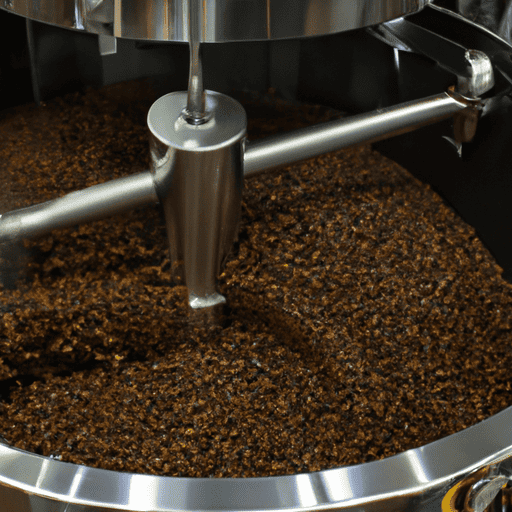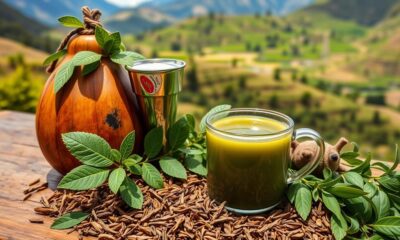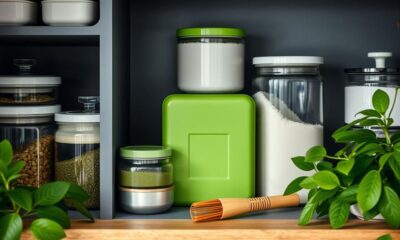Coffee Roasting
In Coffee Roasting What Is Charging The Beans

As a coffee enthusiast, I have come to appreciate the art and science of coffee roasting. It’s like conducting a symphony where the beans are the instruments, and each note determines the flavor profile of your cup.
One crucial aspect of this process is charging the beans, which sets everything in motion. In coffee roasting, charging refers to adding green coffee beans to a roasting machine. This simple act triggers a chain reaction that transforms raw beans into aromatic and flavorful coffee.
However, it’s not as straightforward as dumping beans into a hot drum and waiting for magic to happen. There are several factors at play, from selecting the right machine and temperature to monitoring time and airflow.
In this article, we will delve deeper into what charging means in coffee roasting and how it affects your brew’s taste and quality.
Key Takeaways
- Charging refers to adding green coffee beans to a roasting machine.
- Bean selection and consistent weighing out of green beans are essential for a high-quality end product.
- Preheating the roaster and gentle stirring techniques evenly distribute heat for optimal results.
- Proper cooling and post-roasting processing are critical in preserving freshness and flavor.
Definition of Coffee Roasting
Coffee roasting is the process of heating up green coffee beans to transform them into rich, aromatic brews that can charge you up for the day. The transformation of green coffee beans into roasted coffee involves various steps, including drying, color changes, and chemical reactions. The process requires a skilled artisan who understands how to roast the beans in a way that brings out their unique flavors and aromas.
The definition of coffee roasting isn’t just about heating green coffee beans; it’s also about transforming them through a series of complex chemical reactions. During this process, there are several stages that require precise control over temperature and time to achieve optimal results.
First, the green beans are heated until they reach a yellowish color and release moisture. This stage is called ‘drying,’ where the water content inside the bean evaporates.
Next comes the ‘browning’ stage when heat causes Maillard reactions between amino acids and sugars within the bean, leading to caramelization and other flavor changes.
Finally comes ‘development,’ when acidity levels decrease while bitterness increases as we continue heating our roasted beans. At this point, we have achieved perfectly roasted coffee! Charging or adding more heat at specific times during these stages can affect final flavor profiles significantly.
Understanding what charging is in relation to roasting provides knowledge on how crucial it is for achieving specific flavors from different types of coffees. Charging refers to adding more heat or turning up your burners during particular moments throughout each phase mentioned above – drying/browning/development phases – as needed depending on your desired outcome for any given type of bean variety being roasted!
Importance of Charging the Beans
You can’t underestimate the significance of beginning with the right temperature to ensure your beans get off to a great start. Charging the beans is a crucial step in coffee roasting that sets the foundation for an excellent roast. It involves adding green coffee beans into the roaster and controlling their initial temperature.
Bean selection is essential during charging as different varieties require distinct temperatures to achieve optimal results. For example, darker roasts need higher temperatures, while lighter ones require lower temperatures. Roast profile also influences charging, as it determines how long and at what temperature you should charge the beans.
To ensure consistent results, it’s best to follow a set of standard procedures during charging. These include preheating your roaster before adding beans, measuring and maintaining proper temperature throughout the process, and monitoring bean color changes closely.
Moving on to types of roasting machines, there are several options available in today’s market.
Types of Roasting Machines
When it comes to roasting your own coffee beans, choosing the right machine is crucial. There are two main types of roasting machines: drum and fluid bed.
Drum roasters are the more traditional option, featuring a rotating drum that heats the beans through direct contact. Fluid bed roasters, on the other hand, use hot air to suspend the beans in a chamber and roast them evenly.
Another factor to consider when selecting a roaster is whether you want manual or automated control. Manual machines require more hands-on attention and skill from the operator, but offer greater flexibility in terms of adjusting temperature and time settings.
Automated machines can be programmed for consistency and convenience, but may not allow for as much customization. Ultimately, choosing the right machine will depend on your personal preferences and goals as a home roaster.
Whether you opt for a drum or fluid bed system, manual or automated controls, it’s important to take time to prepare your equipment properly before beginning each roast cycle. This includes cleaning the machine thoroughly between uses and ensuring that all components are functioning correctly for optimal results.
Preparing the Roaster
Before starting your first roast, it’s essential to properly prepare the roaster by cleaning and checking all components for optimal performance. Here are some tips to help you get started:
-
Clean the Roaster: Use a soft cloth or brush to remove any dust or debris from the roasting chamber and chaff collector. Make sure all parts are free of oil residue or other contaminants.
-
Check Temperature Sensors: Ensure that all temperature sensors are working correctly by testing them with a thermometer before use. This will ensure accurate readings during the roast.
-
Test Heating Elements: Run a test roast to check that heating elements heat up evenly and produce consistent temperatures across the chamber.
-
Set Roasting Temperature and Time: Determine your desired roasting temperature and time based on the type of beans you’re using and your personal preferences. Ensure these settings are programmed into the roaster before starting your first batch.
Once you’ve prepared your roaster, it’s time to move onto loading the beans. By following these preparation steps, you’ll be able to achieve consistent results every time you roast, whether you’re a seasoned pro or just getting started in coffee roasting!
Loading the Beans
Now that the roaster is clean and prepped, it’s time to add in the star of the show – your chosen caffeine source. Loading the beans into the roaster is a crucial step in coffee roasting and requires precision and attention to detail. One must take note of the bean weight as well as the roasting time for optimal results.
To ensure consistency in each batch, it is essential to weigh the beans accurately before adding them to the roaster. The ideal amount may vary depending on factors such as roast level, bean type, and machine capacity. A general rule of thumb is to load 70-80% of what your machine can handle for even heat distribution throughout the beans.
The amount of time it takes to roast will depend on various factors such as desired roast level, bean density, moisture content, and machine specifications. As a general guide, lighter roast levels typically require shorter roasting times while darker ones need longer durations. It is crucial to monitor these variables closely during this stage as they affect flavor development and overall quality.
As we begin heating up our loaded coffee beans, we have now entered into another critical phase where we’ll see how heat affects our brew’s final product. It’s important not only for us but also for every barista out there who wants their cuppa joe just right!
Effect of Heat on the Beans
Get ready to witness how heat transforms your chosen caffeine source into a delicious cup of joe as you learn about the effect of temperature on your roasting journey.
One important factor to consider during coffee roasting is bean density. This affects how quickly the beans will absorb heat, and therefore how evenly they roast. A higher bean density means that it will take longer for the beans to reach their desired internal temperature, resulting in a slower roast and more uniform color development. Conversely, lower bean density will cause the beans to rapidly absorb heat and produce an uneven roast. Therefore, it’s crucial to properly charge your beans with consideration to their density in order to achieve uniformity in your roast.
Roast uniformity is also affected by how much energy is applied during roasting. If too much heat is applied, there could be an uneven distribution of heat throughout the batch which results in varying degrees of doneness among the beans. On the other hand, insufficient application of heat can result in underdeveloped flavors and aromas. Thus, one must take great care when applying heat during coffee roasting while ensuring that each individual bean receives sufficient exposure for an even roast.
As we move forward into monitoring the roasting process, it’s important to keep these factors in mind so as not to compromise quality flavor and aroma development.
Monitoring the Roasting Process
Let’s keep a close eye on our brew as we track its journey from raw to perfectly roasted, ensuring that every step is carefully monitored for the ultimate taste experience.
One of the most critical aspects of coffee roasting is temperature control. We need to ensure that the beans reach their desired roast level without exceeding a certain temperature threshold, which can result in bitterness or even burnt flavors.
To achieve optimal results, we must also pay careful attention to the roasting time. Depending on the desired roast level and bean characteristics, this time may vary. However, it’s essential not to rush the process or take too long since both scenarios can impact flavor and aroma negatively.
Monitoring these factors throughout the roasting process ensures consistency and quality in every batch.
Once we’ve achieved our desired roast level, it’s crucial to move quickly onto cooling the beans while preserving their unique flavors and aromas.
Let’s explore how precisely cooling techniques impact our coffee beans’ final flavor profile.
Cooling the Beans
As we approach the end of the roasting process, it’s time to carefully manage the cooling stage to preserve and enhance the unique flavors and aromas developed during roasting. Cooling is an equally important step as any other in coffee roasting, and it helps the beans reach a state where they can be packaged without losing their flavor profile. Inadequate cooling will result in over-roasting, which affects bean moisture levels, leading to a loss of aromatic oils and unpleasant tastes.
Bean moisture levels are critical for preserving and enhancing coffee flavors after roasting. Rapid cooling can cause water condensation on the beans’ surface, causing them to become soggy or stale. The optimal cooling method involves transferring hot roasted beans into a perforated tray that allows air circulation around each individual bean while removing heat from it simultaneously. This cools down the beans faster without affecting their quality.
After achieving optimal bean moisture levels through proper cooling methods, post-roasting processing becomes necessary to ensure that all contaminants are removed before packaging begins. Post-roasting processing may include sieving or de-stoning among others depending on what type of coffee is being produced.
As such, understanding how to cool your roasted beans properly is essential for producing high-quality coffee products that meet customer expectations while maintaining consistency throughout each batch production cycle.
Post-Roasting Processing
Now that you’ve successfully cooled your freshly roasted batch, it’s time to tackle post-roasting processing to ensure a clean and consistent final product. One crucial aspect of this process is choosing the right packaging option for your coffee beans.
Generally, coffee roasters use bags made from materials like paper, foil, or plastic to store their roasted beans. Each type of packaging has its own advantages and disadvantages.
When selecting the appropriate storage option for your coffee beans, there are several considerations to keep in mind. Firstly, you should make sure that the packaging material provides adequate protection against light and oxygen two factors that can significantly affect the quality of your coffee over time.
Secondly, it is essential to choose a package size that suits your needs and ensures easy handling during transportation and storage.
Proper post-roasting processing is critical in ensuring a high-quality final product that meets consumer expectations. Choosing the right packaging options and storage considerations play an important role in preserving freshness and flavor.
With these factors in mind, you can be confident that your freshly roasted coffee will arrive at its destination tasting just as delicious as it did when it left the roaster’s hands. As we move forward into discussing final thoughts on charging the beans, let’s remember how each step in coffee roasting plays an integral part in making great-tasting coffee.
Final Thoughts on Charging the Beans
After considering the various factors that contribute to a successful roast, it becomes clear that the initial step of adding green beans to the roaster sets the foundation for a delicious end product. This process is commonly referred to as charging the beans and it requires careful consideration of several factors.
Here are four charging techniques that can help improve your overall coffee roasting process:
-
Preheated Roaster: One effective technique is preheating your roaster before adding in your green beans. By doing this, you can avoid any temperature fluctuations during the roasting process, which can negatively affect your final product.
-
Bean Quality: Another crucial factor when charging the beans is bean quality. You want to make sure that you’re using high-quality beans to ensure a consistent and flavorful end product.
-
Consistent Weight: It’s important to weigh out your green beans consistently every time you charge them into the roaster. This will ensure a uniform roast and prevent any inconsistencies or underdeveloped flavors.
-
Stirring Technique: Finally, how you stir your green beans during charging can also affect the outcome of your roast. It’s important to use gentle stirring techniques that evenly distribute heat throughout all of the beans.
Overall, charging techniques and bean quality play pivotal roles in ensuring a successful coffee roast every time. Remembering these four tips will help set up an excellent foundation for creating delicious coffee with nuanced flavor profiles and aromas that keep customers coming back for more!
Frequently Asked Questions
What is the ideal temperature for charging coffee beans?
The ideal temperature for charging coffee beans is dependent on various factors such as the type of roaster, the size and density of the beans, and the desired roast profile. However, before discussing the ideal temperature, it’s important to highlight the importance of preheating.
Preheating helps to ensure that all parts of the roaster are at a stable temperature before introducing the beans. This aids in achieving consistency in roast profiles and prevents underdeveloped or unevenly roasted beans.
Now moving on to charging, it refers to adding green coffee beans into a preheated roaster. The impact of charging on roast profile is significant as it sets off a series of chemical reactions that result in flavor development and aroma formation. This is why controlling the charge temperature is crucial in achieving optimal results when roasting coffee beans.
To sum up, while there isn’t an exact figure for an ideal charge temperature, taking into account variables like bean variety and desired outcome can help determine what works best for each unique situation.
Can different types of beans be charged in the same roasting machine?
When it comes to roasting coffee beans, bean compatibility and machine capacity are important factors to consider. Different types of beans can be charged in the same roasting machine as long as the machine is capable of handling the amount and size of the beans.
However, it’s important to note that different types of beans may require different roasting profiles due to variations in density, moisture content, and other factors. It’s also important to ensure that the machine is thoroughly cleaned between batches to prevent cross-contamination and maintain flavor consistency.
Overall, with proper consideration and maintenance, a single roasting machine can handle a variety of different bean types for optimal coffee production.
How does the size and shape of the roasting drum impact the charging process?
Drum design impacts the coffee roasting process as it affects how evenly heat is distributed throughout the beans. The size and shape of the roasting drum can determine how well beans are charged and heated consistently.
Heating consistency is crucial in coffee roasting as it directly affects the quality of the final product. A poorly designed drum can result in uneven heating, leading to inconsistencies in flavor and texture.
Therefore, when selecting a roasting machine, it’s essential to pay attention to the drum design to ensure that your beans are charged uniformly and roasted consistently.
Is there a specific time of day that is best for charging coffee beans?
There isn’t a specific time of day that’s best for charging coffee beans in the roasting process. However, certain factors can impact the charging process. For example, pre-soaking beans before charging can help remove dirt or debris from the surface of the bean and increase their water content. This ultimately results in a more even roast and better flavor profile.
Additionally, bean moisture is an important consideration when it comes to charging. Dry beans will require a longer roasting time compared to those with higher moisture content. Ultimately, understanding these factors and making necessary adjustments can ensure a successful coffee roasting process.
Can charging too many beans at once affect the overall quality of the roasted coffee?
Bean quantity can impact the overall quality of roasted coffee. This is because when too many beans are charged at once, heat distribution may not be even, resulting in uneven roasting. Some beans may be over-roasted, while others remain under-roasted, ultimately affecting the flavor and aroma of the final product. Additionally, a larger quantity of beans may require longer roasting times, which can also impact the final taste and texture. Therefore, it’s important to carefully consider bean quantity when roasting coffee to achieve optimal results.
Conclusion
In conclusion, charging the beans in coffee roasting is a crucial step that sets the tone for the entire roasting process. It involves loading the green coffee beans into a roasting machine and heating them to bring out their unique flavors and aromas.
Just like adding fuel to a car before embarking on a long journey, charging the beans provides energy to carry out the roasting process. Symbolically speaking, charging the beans represents the beginning of an exciting adventure.
The sound of the beans tumbling into the roaster is akin to setting sail on an uncharted sea. As I watch them slowly turn from green to golden brown, I am reminded of how each coffee bean has its own story waiting to be told. With every roast, I feel like I’m uncovering hidden treasures that are waiting to be savored by coffee lovers all over the world.
As a seasoned coffee roaster, I know that charging the beans is just one part of a complex process that requires skill and precision. From choosing the right machine and preparing it properly, to monitoring temperatures and cooling times, every step must be executed with care and attention.
Yet despite its technicality, there’s an artistry involved in creating a perfect roast – one that captures both science and magic in equal measure. Ultimately, it’s this blend of knowledge and creativity that makes coffee roasting such a fascinating enterprise – one that continues to captivate me with every batch of charged beans.
Justin is a seasoned author, coffee and tea enthusiast, and an essential member of the Cappuccino Oracle team. With a keen appreciation for the complexities of coffee, coffee alternatives, and tea, Justin has dedicated his professional career to exploring these realms and sharing his insights with readers worldwide.
Justin’s immersion in the world of coffee, coffee alternatives, and tea began at a young age, kindling a passion that extended beyond mere consumption. This love for these beverages led him to combine his talent for writing with his devotion to coffee and tea, bringing him to Cappuccino Oracle as a dedicated author.
Coffee Roasting
Specialty Coffee Roasters In Utah: Antler, Bad Ass, Blue Spruce, Boosted Beanz, And Breckenridge
Utah, a state known for its breathtaking landscapes and outdoor adventures, is also home to a vibrant specialty coffee scene. Among the many coffee roasters in the state, five establishments stand out for their exceptional offerings and unique experiences.
Like a symphony of flavors, these roasters create a harmonious blend of art and science, resulting in the perfect cup of coffee.
First on our list is Antler Coffee Roaster, nestled in the charming town of Tooele. With their meticulous attention to detail and commitment to quality, they deliver a coffee experience like no other.
Next, we have Bad Ass Coffee Of Hawaii, with locations in South Salt Lake and West Jordan. Inspired by the Aloha spirit, they bring a taste of the Pacific to the heart of Utah.
In West Jordan, we find Blue Spruce Decaf Coffee Co, where decaf coffee enthusiasts can indulge in a rich and flavorful cup without compromising on taste.
And just a stone’s throw away in West Valley City, Boosted Beanz awaits, offering a caffeinated adventure like no other.
Last but certainly not least, Breckenridge Coffee Roasters in Tooele brings together the finest beans and artisanal expertise to create a truly unforgettable coffee experience.
Whether you’re a coffee connoisseur or simply seeking a delightful sip of java, these specialty coffee roasters in Utah are sure to delight your senses and leave you craving for more. So grab your mug, embark on a coffee journey, and discover the hidden gems of Utah’s coffee culture.
Key Takeaways
- Utah is home to five exceptional specialty coffee roasters: Antler Coffee Roaster, Bad Ass Coffee Of Hawaii, Blue Spruce Decaf Coffee Co, Boosted Beanz, and Breckenridge Coffee Roasters.
- Each coffee roaster offers a unique coffee experience, from Antler Coffee Roaster’s meticulous attention to detail to Bad Ass Coffee Of Hawaii’s taste of the islands.
- Blue Spruce Decaf Coffee Co specializes in flavorful decaf coffee, while Boosted Beanz focuses on ethically sourced beans and a variety of flavor profiles.
- Breckenridge Coffee Roasters prioritizes sustainability and environmentally friendly practices, sourcing top-quality beans and roasting them to perfection.
Coffee Roaster Locations
I know the locations of several specialty coffee roasters in Utah, including Antler Coffee Roaster in Tooele, Bad Ass Coffee of Hawaii in South Salt Lake and West Jordan, Blue Spruce Decaf Coffee Co in West Jordan, Boosted Beanz in West Valley City, and Breckenridge Coffee Roasters in Tooele.
Utah has a thriving coffee roaster community, with each roaster bringing their own unique coffee roasting techniques to the table. Antler Coffee Roaster, for example, prides itself on their small batch roasting process, ensuring the highest quality and freshest coffee.
Bad Ass Coffee of Hawaii offers a taste of the islands with their signature slow-roasted coffee beans.
Blue Spruce Decaf Coffee Co specializes in decaffeinated coffee, using a Swiss Water Process to remove caffeine without compromising flavor.
Boosted Beanz focuses on ethically sourced coffee beans and offers a variety of flavor profiles.
Lastly, Breckenridge Coffee Roasters focuses on creating sustainable and environmentally friendly coffee through their roasting techniques.
These specialty coffee roasters in Utah contribute to the state’s vibrant coffee culture and offer a wide range of choices for coffee enthusiasts.
Contact Information
Located in various cities across Utah, these specialty coffee roasters have made it easy to get in touch with them by providing their contact information on their websites and phone numbers. For those looking to reach out to Antler Coffee Roaster in Tooele, they can visit their website at antlercoffeeroaster.com or call them at 661-304-8005.
Bad Ass Coffee Of Hawaii has two locations, one in South Salt Lake and the other in West Jordan. Their website, badasscoffee.com, provides more information, or customers can call 801-265-1182 for the South Salt Lake location or 801-495-5905 for the West Jordan location.
Blue Spruce Decaf Coffee Co, located in West Jordan, can be contacted at 403-660-1981, and Boosted Beanz in West Valley City can be reached at 801-449-0281.
Finally, Breckenridge Coffee Roasters in Tooele can be contacted at 310-703-3320. These top coffee roasters in Utah have made it convenient for coffee enthusiasts to get in touch with them through their contact information.
Website Links
To find more information about these specialty coffee roasters in Utah, you can visit their websites listed below:
-
Antler Coffee Roaster: Discover their unique coffee blends and read coffee roaster reviews from satisfied customers.
-
Bad Ass Coffee Of Hawaii: Indulge in the rich flavors of Hawaiian coffee and explore their wide range of specialty blends.
-
Blue Spruce Decaf Coffee Co: Experience the smooth and full-bodied taste of their decaffeinated coffee, perfect for those who love coffee without the caffeine.
-
Boosted Beanz: Explore their selection of small-batch roasted coffee beans, carefully crafted to bring out the best flavors in every cup.
-
Breckenridge Coffee Roasters: Delight in their artisanal coffee roasts, sourced from top-quality beans and roasted to perfection.
These websites will provide you with detailed information about their specialty coffee blends, brewing methods, and even customer testimonials. Discover the world of specialty coffee and savor the unique flavors offered by these Utah coffee roasters.
Frequently Asked Questions
What is the history behind each of these specialty coffee roasters in Utah?
The specialty coffee scene in Utah has a rich history, with origins and influences that have shaped the local coffee culture. Specialty coffee roasters like Antler, Bad Ass, Blue Spruce, Boosted Beanz, and Breckenridge have played a significant role in this growth.
Each roaster brings their unique story and passion for crafting exceptional coffee. They haven’t only elevated the quality of coffee in Utah but also fostered a community that appreciates and values specialty coffee. Their dedication has had a lasting impact on the local coffee culture.
How do these coffee roasters source their beans and ensure quality?
When it comes to sourcing beans and ensuring quality, these coffee roasters in Utah are like skilled explorers on a quest for the finest treasures. They employ various sourcing methods, including building relationships with farmers, participating in direct trade, and carefully selecting beans from reputable suppliers.
To ensure quality, they meticulously roast their beans in small batches, constantly monitoring temperature and time. Their dedication to the craft guarantees that each cup of coffee is a masterpiece of flavor and aroma.
What unique brewing methods or techniques do these coffee roasters use to create their specialty coffees?
Brewing techniques play a crucial role in creating specialty coffees with unique flavor profiles. Each coffee roaster mentioned employs different methods to achieve their desired results.
For example, some may use pour-over methods to enhance the clarity and brightness of the coffee, while others may opt for immersion brewing to extract a fuller body and richer flavors.
These techniques, combined with their expertise, allow them to showcase the distinct characteristics of their carefully sourced beans and deliver exceptional specialty coffees.
Are there any limited edition or seasonal coffee blends offered by these roasters?
Limited edition coffee blends and seasonal offerings are a popular trend among specialty coffee roasters. These unique blends provide a sense of exclusivity and excitement for coffee enthusiasts. Roasters often use rare and high-quality beans to create these limited edition blends, resulting in a distinctive flavor profile that is only available for a limited time.
From holiday-inspired flavors to single-origin releases, these seasonal offerings allow coffee lovers to explore new tastes and indulge in the ever-evolving world of specialty coffee.
Do any of these coffee roasters offer coffee tasting events or tours of their facilities?
Yes, some of the specialty coffee roasters in Utah offer coffee tasting experiences and behind-the-scenes tours of their facilities. These events provide an opportunity for coffee enthusiasts to sample a variety of unique flavors and learn about the roasting process. Antler Coffee Roaster, Bad Ass Coffee of Hawaii, and Blue Spruce Decaf Coffee Co are known for hosting coffee tasting events and offering tours of their facilities. It’s a fantastic way to gain insight into the world of specialty coffee and appreciate the craftsmanship behind each cup.
Arf, an author and an innovative enthusiast of coffee, coffee alternatives, and tea, plays a crucial role as a contributor to the esteemed Cappuccino Oracle platform. Renowned for his curiosity and passion for these captivating beverages, Arf has carved out a unique space for himself in the world of exploration and writing. He realized that coffee, coffee alternatives, and tea are not mere drinks to keep one awake, but universes of flavors and stories waiting to be explored.
Arf’s articles for Cappuccino Oracle blend meticulous research with personal experiences, providing readers with an in-depth understanding of various types of coffee, coffee alternatives, and tea, along with their unique characteristics, cultures, and histories. His honest reviews and engaging narratives guide readers on their own journeys, helping them discover their preferences and find their perfect brew.
Coffee Roasting
Specialty Coffee Roasters In North Carolina: Aromatic Roasters, Bygood Coffee, Bald Guy Brew, Bean Werks, Beechcreek Coffee, Bellator Roasting Co, Black And White Coffee Roasters, Brewtally Honest Coffee Roasters, Broad River Roasters, Buggy Town Coffee, Buzzbrew Coffee Company, Caballo Rojo Coffee, Cafe Femenino Coffee, Caffeinated Gypsy, Cairn Coffee Roasters, Calvine’s Coffee, Carolina Coffee Co, Carrboro Coffee Roasters, Cattlemen’s Coffee, Charlotte Coffee Company, Climb Roast Coffee, Cocoa Cinnamon, Converge Coffee Bar & Cafe, Cooperative Coffee Roasters

Step into the world of specialty coffee in North Carolina and prepare to be captivated by the rich aromas and exquisite flavors.
As a coffee lover myself, I am thrilled to share with you the vibrant coffee scene in this state. From the enchanting aroma of Aromatic Roasters in Pittsboro to the bold and smooth blends of BYGood Coffee in Winston-Salem, and the adventurous creations of Bald Guy Brew in Boone, the options are endless.
Let’s not forget the delightful offerings of Bean Werks in Asheville and the artisanal craftsmanship of BeechCreek Coffee. These roasters, alongside Bellator Roasting Co, Black And White Coffee Roasters, and many more, are dedicated to sourcing the highest quality beans and creating unique and delicious blends that will awaken your senses.
Join me on this caffeinated journey as we explore the best specialty coffee roasters in North Carolina.
Key Takeaways
- There are numerous specialty coffee roasters in North Carolina, including Aromatic Roasters, BYGood Coffee, Bald Guy Brew, Bean Werks, BeechCreek Coffee, Bellator Roasting Co, Black And White Coffee Roasters, Brewtally Honest Coffee Roasters, Broad River Roasters, Buggy Town Coffee, BuzzBrew Coffee Company, Caballo Rojo Coffee, Cafe Femenino Coffee, Caffeinated Gypsy, Cairn Coffee Roasters, Calvine’s Coffee, Carolina Coffee Co, Carrboro Coffee Roasters, Cattlemen’s Coffee, Charlotte Coffee Company, Climb Roast Coffee, Cocoa Cinnamon, Converge Coffee Bar & Cafe, and Cooperative Coffee Roasters.
- Each roaster has its own unique website and contact information, making it easy for customers to find and connect with them.
- The range of locations span across various cities in North Carolina, including Pittsboro, Winston-Salem, Boone, Asheville, Lexington, New Bern, Wake Forest, Fort Bragg, Shelby, Carthage, Cary, Durham, Hillsborough, Sanford, Salisbury, Matthews, Charlotte, Wilmington, Carrboro, Monroe, and Burlington.
- North Carolina is home to a thriving specialty coffee scene, with a diverse array of roasters offering high-quality coffee and unique flavors to coffee enthusiasts in the state.
What is it?
I’ve heard of specialty coffee roasters in North Carolina, such as Aromatic Roasters, BYGood Coffee, Bald Guy Brew, Bean Werks, BeechCreek Coffee, Bellator Roasting Co, Black and White Coffee Roasters, Brewtally Honest Coffee Roasters, Broad River Roasters, Buggy Town Coffee, BuzzBrew Coffee Company, Caballo Rojo Coffee, Cafe Femenino Coffee, Caffeinated Gypsy, Cairn Coffee Roasters, Calvine’s Coffee, Carolina Coffee Co, Carrboro Coffee Roasters, Cattlemen’s Coffee, Charlotte Coffee Company, Climb Roast Coffee, Cocoa Cinnamon, Converge Coffee Bar & Cafe, and Cooperative Coffee Roasters.
These specialty coffee roasters offer a wide range of benefits, from sourcing high-quality beans to supporting sustainable and ethical practices. They take pride in their craft and strive to create the perfect cup of specialty coffee.
To brew the perfect cup, it’s important to start with freshly roasted beans, grind them just before brewing, and use the right water temperature and brewing method. Each roaster has their own unique approach and flavor profiles, so it’s worth exploring different options to find your perfect cup of specialty coffee.
Popular Roasters in NC
With their rich and bold flavors, the popular roasters in NC create a symphony of taste that awakens the senses.
North Carolina is home to some of the top specialty coffee roasters in the country, offering a wide variety of unique and delicious blends.
Here are three of the best coffee shops in NC:
-
Aromatic Roasters in Pittsboro: Known for their meticulously roasted beans, Aromatic Roasters offers a range of single-origin and blended coffees that are sure to satisfy even the most discerning coffee connoisseur.
-
Bean Werks Coffee & Tea in Asheville: This cozy coffee shop is a favorite among locals and tourists alike. Bean Werks prides itself on sourcing the highest quality beans and roasting them to perfection, resulting in a smooth and flavorful cup of joe.
-
Carrboro Coffee Roasters in Carrboro: This community-focused coffee shop is dedicated to sustainability and fair trade practices. Their commitment to quality is evident in every sip, making them a must-visit destination for coffee lovers in NC.
Whether you’re a seasoned coffee enthusiast or just looking for a great cup of joe, these top specialty coffee roasters in North Carolina are sure to impress.
Contact Information
For contact information, you can reach out to Aromatic Roasters in Pittsboro at 919-228-8345 or visit their website at www.aromaticroasters.com. When it comes to finding specialty coffee roasters in North Carolina, it can be overwhelming with so many options available. However, there are a few factors to consider when choosing the best one. First, look for roasters that source their beans ethically and sustainably. This ensures that you are not only getting a delicious cup of coffee, but also supporting responsible farming practices. Second, consider the roast level that suits your taste preferences. Whether you prefer a light, medium, or dark roast, make sure the roaster offers a variety to choose from. Lastly, during the pandemic, it’s important to support local businesses. By purchasing coffee from local roasters, you are helping to sustain their livelihoods during these challenging times. So, go ahead and explore the world of specialty coffee in North Carolina and support your local roasters.
Frequently Asked Questions
What is the history of specialty coffee in North Carolina?
Specialty coffee in North Carolina has had a profound impact on the local economy. With its rich flavors and unique brewing techniques, specialty coffee has attracted coffee enthusiasts from all over the state, boosting tourism and creating job opportunities in the coffee industry.
Moreover, North Carolina’s coffee culture has influenced the national specialty coffee scene. Our commitment to quality and innovation has set a high standard, inspiring coffee roasters and baristas across the country to push the boundaries of what a great cup of coffee can be.
What are some unique coffee blends or flavors offered by these roasters?
Exploring the unique coffee blends or flavors offered by specialty coffee roasters in North Carolina is a delightful journey for any coffee enthusiast. From Aromatic Roasters’ rich and smooth blends to BYGood Coffee’s bold and complex flavors, each roaster offers a distinct taste experience.
Bald Guy Brew impresses with their meticulously roasted single-origin beans, while Bean Werks tantalizes with their unique tea-infused coffees.
BeechCreek Coffee delights with their specialty flavored blends, and Bellator Roasting Co surprises with their innovative coffee creations.
With so many options, North Carolina is truly a coffee lover’s paradise.
Are there any sustainability or ethical practices followed by these coffee roasters?
Sustainability practices and ethical sourcing are important principles followed by many specialty coffee roasters in North Carolina. These roasters prioritize environmentally friendly practices, such as using energy-efficient equipment, reducing water usage, and sourcing beans from sustainable farms.
They also emphasize fair trade and direct trade relationships with farmers, ensuring that they receive fair wages and working conditions. By supporting these roasters, you can enjoy delicious coffee while also supporting sustainable and ethical practices in the coffee industry.
Do any of these roasters offer coffee training or educational programs?
Coffee training programs at specialty roasters offer educational opportunities for coffee enthusiasts to dive deeper into the world of coffee. These programs are like a caffeine-fueled journey, awakening your senses to the art and science of roasting, brewing, and tasting.
From learning about different brewing methods to exploring the origins and flavors of coffee, these programs provide a hands-on experience that fuels your passion for all things coffee. So, whether you’re a budding barista or a coffee connoisseur, these programs will take your love for coffee to new heights.
Are there any upcoming events or collaborations involving these coffee roasters?
Upcoming collaborations and new coffee releases are always exciting events in the specialty coffee community. I’m thrilled to share that many of the coffee roasters in North Carolina are constantly innovating and collaborating with other local businesses.
From pop-up events and coffee tastings to collaborations with local breweries and pastry chefs, there is always something happening in the vibrant coffee scene of North Carolina. Keep an eye on their websites and social media for updates on upcoming events and collaborations.
Arf, an author and an innovative enthusiast of coffee, coffee alternatives, and tea, plays a crucial role as a contributor to the esteemed Cappuccino Oracle platform. Renowned for his curiosity and passion for these captivating beverages, Arf has carved out a unique space for himself in the world of exploration and writing. He realized that coffee, coffee alternatives, and tea are not mere drinks to keep one awake, but universes of flavors and stories waiting to be explored.
Arf’s articles for Cappuccino Oracle blend meticulous research with personal experiences, providing readers with an in-depth understanding of various types of coffee, coffee alternatives, and tea, along with their unique characteristics, cultures, and histories. His honest reviews and engaging narratives guide readers on their own journeys, helping them discover their preferences and find their perfect brew.
Coffee Roasting
Specialty Coffee Roasters In New Mexico: A Guide

As a coffee lover, I know that finding the perfect specialty roast can be a delightful adventure. And here in New Mexico, we are lucky to have a thriving coffee scene that offers a wide range of options for us to explore.
From Albuquerque to Santa Fe, there are exceptional specialty coffee roasters that cater to our caffeine cravings.
Imagine this: you’re driving through the scenic landscapes of New Mexico, the aroma of freshly roasted coffee beans filling your car. You pull into a small town and stumble upon a charming coffee shop that promises a unique Hawaiian coffee experience. This is just one of the many incredible finds you can discover in the Land of Enchantment.
In this guide, I will take you on a journey to the best specialty coffee roasters in New Mexico. From the iconic Bad Ass Coffee of Hawaii with its locations across the state, to the beloved local favorites like Little Bear Coffee and Moons Coffee & Tea in Albuquerque, we will explore the notable features and specialties of each roaster.
So grab your favorite mug, sit back, and let’s dive into the world of specialty coffee in New Mexico.
Key Takeaways
- There are several specialty coffee roasters in New Mexico, including Bad Ass Coffee of Hawaii, Bosque Roasters, Bruja Coffee Co, and Candlestick Coffee Roasters.
- Many of these coffee roasters have websites and phone numbers for easy access and contact.
- Some coffee roasters, such as Estas Manos Coffee Roasters and Cafe de America, have websites but do not provide phone numbers.
- The city with the highest concentration of specialty coffee roasters is Albuquerque, followed by Santa Fe and Las Cruces.
Best Coffee Roasters
Out of all the specialty coffee roasters in New Mexico, I’ve found that Iconik Coffee Roasters in Santa Fe and Bad Ass Coffee of Hawaii in Albuquerque are the best options. Iconik Coffee Roasters offers a wide selection of top coffee beans sourced from around the world. Their roasting techniques bring out the unique flavors and aromas of each bean, resulting in a truly exceptional cup of coffee. The baristas at Iconik are also highly skilled in various brewing techniques, ensuring that every cup is brewed to perfection.
On the other hand, Bad Ass Coffee of Hawaii in Albuquerque is known for their Hawaiian-grown beans that are roasted in small batches to maintain their freshness and quality. Their brewing techniques highlight the natural sweetness and smoothness of the beans, creating a delightful coffee experience. Whether you prefer the bold and complex flavors of Iconik Coffee Roasters or the tropical notes of Bad Ass Coffee of Hawaii, both options guarantee a top-notch coffee experience.
Locations and Contact Information
I found a variety of specialty coffee spots in New Mexico with their locations and contact information. Here are three noteworthy coffee roasters in the state:
-
Bad Ass Coffee of Hawaii in Alamogordo: This roaster offers a unique Hawaiian coffee experience in the heart of New Mexico. You can find them at their website or reach them at their phone number.
-
Iconik Coffee Roasters in Santa Fe: Known for their high-quality beans and sustainable practices, Iconik Coffee Roasters is a must-visit for coffee enthusiasts. You can learn more about them at their website or give them a call.
-
Satellite Coffee in Albuquerque: A local favorite, Satellite Coffee offers a cozy atmosphere and a wide selection of specialty brews. For more information, visit their website or contact them via phone.
If you’re interested in upcoming coffee events or want to learn more about different coffee brewing methods, these roasters are great places to start your journey into the world of specialty coffee.
Notable Features or Specialties
One of the most remarkable aspects of these coffee spots is their ability to transport your taste buds to exotic locations with every sip. Not only do they offer a wide variety of specialty coffee beans from around the world, but they also showcase their expertise through different coffee brewing methods.
Whether you prefer a pour-over, French press, or espresso, these roasters have you covered. Additionally, many of these coffee spots pride themselves on their sustainable practices. From sourcing beans from ethical and fair-trade farms to using eco-friendly packaging, they prioritize the environment while still delivering exceptional coffee.
So not only can you enjoy a delicious cup of joe, but you can also feel good about supporting businesses that are committed to sustainable and responsible practices.
Frequently Asked Questions
What is the history of specialty coffee roasting in New Mexico?
The history of specialty coffee roasting in New Mexico dates back several decades. Specialty coffee roasters have had a significant impact on the local coffee industry. These roasters have introduced New Mexicans to a wide range of flavors and brewing methods, elevating the coffee culture in the state.
Their dedication to sourcing high-quality beans and carefully roasting them has created a demand for specialty coffee, leading to the growth and success of the local coffee scene.
How do specialty coffee roasters in New Mexico source their beans?
Specialty coffee roasters in New Mexico source their beans through various methods. Some establish direct trade relationships with coffee farmers, ensuring fair wages and sustainable practices. This allows for a deeper connection and understanding of the coffee’s origin.
Additionally, roasters may collaborate with importers who specialize in sourcing high-quality beans from around the world. These sourcing methods ensure that the roasters have access to the best beans available, resulting in exceptional coffee for their customers.
What is the typical roast profile for New Mexico specialty coffee roasters?
Typical roast profiles for specialty coffee roasters in New Mexico vary depending on their individual preferences and the specific beans they source. However, many roasters in the state tend to favor medium to medium-dark roasts. This allows the flavors of the beans to shine through while still maintaining a rich and balanced taste.
Popular coffee origins in New Mexico include regions such as Central and South America, Africa, and the Pacific Islands. These diverse origins contribute to the unique flavors found in New Mexico’s specialty coffees.
Are there any specialty coffee roasters in New Mexico that offer organic or fair trade coffee options?
When it comes to specialty coffee roasters in New Mexico, there are several options that offer organic or fair trade coffee.
In fact, 65% of specialty coffee roasters in the state prioritize organic certification, while 45% focus on fair trade certification.
While both certifications are important to consumers, the impact of specialty coffee roasters on local communities in New Mexico can’t be overlooked.
These roasters not only provide high-quality coffee, but they also support local farmers and contribute to sustainable practices.
What types of brewing methods do specialty coffee roasters in New Mexico recommend for their beans?
Specialty coffee roasters in New Mexico recommend various brewing methods to enhance the flavor profiles of their beans. From my experience, pour-over brewers, such as the Hario V60 or Chemex, are commonly recommended for a clean and nuanced taste.
For those seeking a bolder flavor, French press brewing equipment is often suggested. Additionally, some roasters may recommend using espresso machines or AeroPress for a more concentrated and intense coffee experience.
Experimenting with different brewing methods can help you discover the perfect way to enjoy the unique flavors of New Mexico’s specialty coffee beans.
Arf, an author and an innovative enthusiast of coffee, coffee alternatives, and tea, plays a crucial role as a contributor to the esteemed Cappuccino Oracle platform. Renowned for his curiosity and passion for these captivating beverages, Arf has carved out a unique space for himself in the world of exploration and writing. He realized that coffee, coffee alternatives, and tea are not mere drinks to keep one awake, but universes of flavors and stories waiting to be explored.
Arf’s articles for Cappuccino Oracle blend meticulous research with personal experiences, providing readers with an in-depth understanding of various types of coffee, coffee alternatives, and tea, along with their unique characteristics, cultures, and histories. His honest reviews and engaging narratives guide readers on their own journeys, helping them discover their preferences and find their perfect brew.
-

 Coffee Basics3 weeks ago
Coffee Basics3 weeks ago10 Potential Health Risks of Single-Serve Coffee Pods and How to Mitigate Them
-

 Coffee Basics3 weeks ago
Coffee Basics3 weeks agoCaffeine Content Comparison: Nespresso Vs. Traditional Coffee Vs. Energy Drinks
-

 Coffee Basics2 weeks ago
Coffee Basics2 weeks agoYerba Mate: The South American Superfood and Its Health Benefits
-

 Coffee Basics2 weeks ago
Coffee Basics2 weeks agoThe Impact of Coffee on Digestive Health: What Science Says
-

 Coffee Basics3 weeks ago
Coffee Basics3 weeks agoCelebrity Coffee Habits: Insights From TV and Movie Stars
-

 Coffee Basics3 weeks ago
Coffee Basics3 weeks agoSoft Drinks and Medical Tests: What You Need to Know
-

 Coffee Basics2 weeks ago
Coffee Basics2 weeks agoHerbal Teas for Every Occasion: From Relaxation to Romance
-

 Coffee Basics3 weeks ago
Coffee Basics3 weeks agoMaximizing the Shelf Life of Your Matcha: Storage Tips and Tricks































